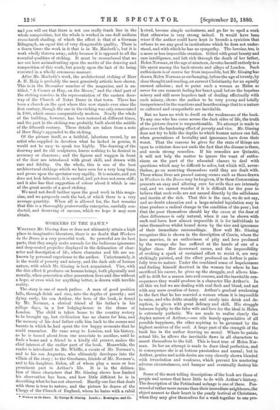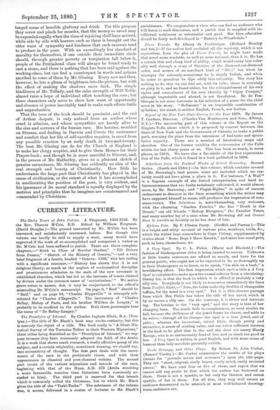WORKERS IN THE DAWN.*
WHETUER Mr. Gissing does or does not ultimately attain a high place in imaginative literature, there is no doubt that Workers in the Dawn is a very powerful work. So powerful are its best parts, that they amply make amends for the ludicrous ignorance and deep-seated prejudice displayed in the delineation of char- acter and description of life, where character and life are un- known by personal experience to the author. Unfortunately, it is the world of poverty and misery, and the dark side of human nature, with which Mr. Gissing is best acquainted. Vice, with the dire effect it produces on human beings, both physically and morally, when generation after generation lives and dies without a hope, or even wish for anything better, is drawn with terrible reality.
The story is one of much pathos. A man of good position falls, through drink and vice, into the depths of poverty ; and dying early, his son Arthur, the hero of the book, is found by Mr. Norman, a clerical friend of his father's in his college days, in a low lodging-house in the slums of London. The child is taken home to the country rectory to be brought up, but civilisation has no charm for him, and the memory of his dead father calls him back to the scenes and haunts in which he had spent the few happy moments that he could remember. He runs away to London, and his history, as he is tossed about from one associate to another, until he finds a home and a friend in a kindly old printer, makes the chief interest of the earlier part of the book. Meanwhile, the reader is introduced to Mr. Whiffle, a curate of Mr. Norman's, and to his son Augustus, who ultimately developes into the villain of the story ; to the Greshams, friends of Mr. Norman's, and to his daughter, Helen, all of whom play a more or less prominent part in Arthur's life. It is in the delinea- tion of these characters that Mr. Gissing shows how limited his observation has been, and how little diffident he is in describing what he has not observed. Hardly one line that deals with them is true to nature, and the picture he draws of the Clergy of the Church of England, whom he hates with a rabid
• Workers in the Down. By George R. (liming. Londoa : Remington and Co.
hared, become simple caricatures, and go far to spoil a work that otherwise is very strong indeed. It would have been wiser if the author could have kept in bounds a cynicism that refuses to see any good in institutions which he does not under- stand, and with which he has no sympathy. The heroine, too, is a more or less impossible creation. Gifted with great beauty and rare intelligence, and left rich through the death of her father, Helen Norman, at the age of nineteen, devotes herself entirelyto a life spent among the back-streets and alleys of London. Such enthusiasm is of course far from impossible, but Mr. Gissing has drawn Helen Norman as exchanging, before the age of twenty, by close thought and reading, an earnest Christianity for an equally earnest atheism ; and to paint such a woman as Helen as never for one moment feeling her heart quail before the hopeless misery and still more hopeless task of dealing effectually with such misery, shows the author to be very young and totally inexperienced in the reactions and heartburnings that to a nature so cultured and sympathetic are inevitable.
But we have no wish to dwell on the weaknesses of the book. To any one who has come across the dark sides of life, the truth of the picture drawn is unquestionable. No attempt is made to gloss over the hardening effect of poverty and vice. Mr. Gissing does not try to hide the depths to which human nature can fall, when generations of brutality and ignorance have done their worst. That the reasons he gives for the state of things are open to criticism does not undo the fact that the disease is there, and needs strong remedies. If his remedies are Quixotic, it will not help the matter to ignore the want of enthu- siasm on the part of the educated classes to deal with questions which may be difficult to solve, but which will, never- theless, go on asserting themselves until they are dealt with. Those whose lives are passed among scenes such as those drawn in Workers in the Dawn may be forgiven, if to them Communism presents an easy and alluring cure for evils that are intensely real, and we cannot wonder if it is difficult for the poor to believe that such evils are not caused directly by the selfishness and inertia of the rich. That this is the case, we do not say, and no doubt education and a large-minded legislation may in time produce a radical change in the condition of the poor ; bat that the poor themselves should lay the cause at the door of class differences is only natural, when it can be shown with such real force how almost impossible it is for individuals to raise themselves whilst bound down by the vice and ignorance of their immediate surroundings. How well Mr. Gissing recognises this is shown in the description of Carrie, whom the hero marries, in an enthusiasm of pity and love produced by the wrongs she has suffered at the hands of one of a higher class. Her downward career, and the impossibility of evoking a spark of sustained effort to resist it, are very strikingly painted, and the effect produced on Arthur is pain- fully true to nature. Under the combined sense of hopelessness and finding himself deceived in the woman for whom he has sacrificed his career, he gives up the struggle, and allows him- self to drift for a season into evil courses, and the inevitable con- sequences they would produce in a character like Arthur's. In all this we feel we are dealing with real flesh and blood, and not with any mere creation of fancy. Arthur's gradual awakening to the fact that he has married a woman whom it is impossible to raise, and who drifts steadily and surely into drink and de- ception, is given with great delicacy and skill. His struggle between loyalty to the false wife and love for the ideal in Helen is extremely pathetic. We are made to realise clearly the duplex nature of Arthur,—one side keenly appreciative of all possible happiness, the other aspiring to be governed by the highest motives of the soul. A large part of the strength of the book lies in the author drawing no moral. Where he paints actual life, he allows the inevitable flaws in all characters to assert themselves to the full. This is least true of Helen Nor- man. In her an attempt is made to draw ideal perfection, and in consequence she is at bottom passionless and unreal; but in Arthur, genius and noble desire are very cleverly shown blended with irresolution and weakness, which prevent his mastering adverse circumstances, and hamper and eventually destroy his life.
Some of the most telling descriptions of the book are those of people and scenes that have little to do with Arthur's history. The description of the Pettindund m6nage is one of these. Pos. sessed of rather more means than their immediate neighbours, the object nearest to their heart is the yearly festival of Christmas, when they may give themselves for a week together to one pro- longed scene of horrible gluttony and drink. For this purpose they screw and pinch for months, that the money so saved may be expended regally when the time of rejoicing shall have arrived, while side by side with horrors such as these is brought out the utter want of sympathy and kindness that such excesses tend to produce in the poor. With an exceedingly low standard of morality for themselves, if one outside their immediate circle should, through greater poverty or temptation fall below it, people of the Pettindund class will always be found ready to cast a stone, and there is nothing that has been said against the working-class, but can find a counterpart in words and actions ascribed to some of them by Mr. Gissing. Every now and then, however, he lets a gleam of brightness into the picture, but with the effect of making the shadows more dark. The simple kindliness of Mr. Tollady, and the calm strength of Will Noble. almost raise a hope of individual effort touching the sore ; but these characters only serve to show how want of opportunity and absence of power inevitably tend to make such efforts futile and unproductive.
That the tone of the book should be pessimist, and the end of Arthur despair, is only natural from an author whose creed is atheism, and whose sympathies are keenly alive to the sins and sorrows of the human race. His heroine, moulded on Strauss, and finding in Darwin and Comte the sustenance and comfort that her life of self-sacrifice requires, is saved from any possible reaction by an early death at two•and-twenty. The best Mr. Gissing can do for the Church of England is to make her clergy sceptics, and to give them Horace for their Prayer-book ; and though he is more merciful to Dissent, and, in the person of Mr. Hatherley, gives us a pleasant sketch of genuine earnestness, Mr. Gissing has evidently no idea of the real strength and beauty of Christianity. How little he understands the large part that Christianity has played in the cause of civilisation, or the extent of what it has accomplished in ameliorating the position of the poor, is very evident, and his ignorance of its moral standard is equally displayed by the motives and principles that he imagines are countenanced and commended by Christians.



































 Previous page
Previous page